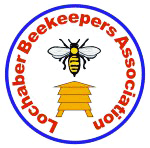New to Beekeeping, or New to Lochaber?
Important Notice
Parts of Lochaber have now been identified as infested with Varroa, but we are extremely fortunate in that there still are pockets of this large region that remain Varroa-free. The West Highlands are one of the few areas of the British Isles with low incidence of bee disease, so it would make sense to do everything we can to keep it so.
Varroa destructor (Varroa mite) is an external parasitic mite that attacks and feeds on honey bees. The Varroa mite can only reproduce in a honey bee colony. It attaches to the body of a bee (larvae and adult) and feeds on it, weakening the bee and making it more susceptible to viruses. A significant mite infestation can often lead to the death of a honey bee colony, usually in the late autumn through early spring.
It is therefore vital that we attempt to control the spread of this parasite, as this is not only beneficial for our own bees, it helps the native/feral bee population, and may help with research into disease management.
Importing bees from non-local sources not only risks of bringing in disease, there are also potentially negative consequences for the genetics of the local bees - it it thought that cross-bred strains can become aggressive, with a loss of the good traits of the native or locally-adapted bees.
We therefore respectfully request that bees from other parts of the country are NOT brought or sold into Lochaber.
We therefore respectfully request that bees from other parts of the country are NOT brought or sold into Lochaber.
From April 21st 2021 under the Bee Diseases and Pests Control [ Scotland ] order 2007 [ as amended ] all Varroa findings MUST be reported to zoology@sasa.gov.scot
You will find that we are a friendly bunch, and we will do what we can to help supply new beekeepers with disease-free bees from within our area.
Please
contact
the Secretary for further information.
